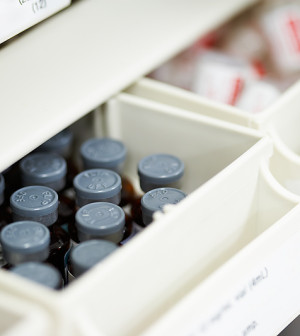- The Best Time of Day to Drink Bone Broth to Maximize Health Benefits
- 8 Ways to Increase Dopamine Naturally
- 7 Best Breads for Maintaining Stable Blood Sugar
- Gelatin vs. Collagen: Which is Best for Skin, Nails, and Joints?
- The Long-Term Effects of Daily Turmeric Supplements on Liver Health
- Could Your Grocery Store Meat Be Causing Recurring UTIs?
- Are You Making This Expensive Thermostat Error This Winter?
- Recognizing the Signs of Hypothyroidism
- 10 Strategies to Overcome Insomnia
- Could Artificial Sweeteners Be Aging the Brain Faster?
Doctors’ Group Urges Greater Use of Generic Drugs

Whenever possible, doctors should prescribe generic drugs for their patients, the American College of Physicians suggests.
Doing so could help patients save money, and might increase the odds that they’ll take their medications as directed, the national organization said.
Every year, about $325 billion is spent on prescription medications in the United States, according to the American College of Physicians (ACP). The group believes this tally could be significantly reduced if people used generic medications, which are just as effective as brand-name drugs.
“While the use of generic drugs has increased over time, clinicians often prescribe more expensive brand-name drugs when equally effective, well-proven, and less-expensive generic versions are available,” ACP President Dr. Wayne Riley said in a news release from the organization.
To shed light on the issue, researchers with the ACP examined how frequently generic drugs are overlooked in favor of brand-name drugs. They also looked at how well generic medications work, and if generic drug use affects how well patients stick to their treatment plan.
The study looked at Medicare patients with diabetes. The investigators found that between 23 and 45 percent of prescriptions were for brand-name drugs, even though identical generics were available. The study revealed that Medicare could save $1.4 billion for diabetes alone by replacing brand-name drugs with generic versions.
The study findings were released online Nov. 23 in the Annals of Internal Medicine.
There are situations where the use of brand-name drugs is necessary, but the use of effective generic medications could help ensure that patients stick to their treatment plan, the study authors said.
Using generics could help motivate patients concerned about out-of-pocket health care costs take their medication as directed by their doctor, the ACP suggested in the news release. An increase in these costs has been linked to lower rates of long-term medication adherence, the researchers explained.
In addition, brand-name drug prescriptions are nearly twice as likely to be left in the pharmacy and never picked up compared to generic drugs, they pointed out.
Brand-name drugs may be chosen over generic medications if the safety or effectiveness of a generic drug is in question. But, most credible research suggests generics are as effective as their brand-name counterparts, according to the ACP.
Some patients think the lower price tag associated with generic drugs suggests they won’t work as well as more expensive brand-name medications. And, the ACP news release said that generic drugs often look different from brand-name drugs, which may be confusing to patients.
Since giving free samples of brand-name drugs to doctors increases use of these medications, researchers suggested that offering doctors free generic samples could have the same effect. Implementing public awareness and advertising campaigns for generic drugs may also help motivate patients to fill their generic prescriptions, the ACP researchers suggested.
More information
The U.S. Food and Drug Administration has more about generic drugs.
Source: HealthDay
Copyright © 2026 HealthDay. All rights reserved.










